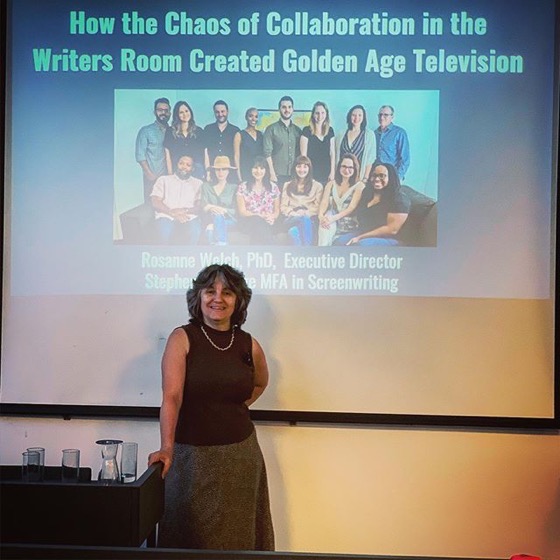Watch the entire presentation – Worry and Wonder | The Courier Thirteen Podcast | Episode # 29 here
Transcript:
So those characters became three-dimensional human beings for the five years he ran the show and then he left and a couple of people who mostly worked in — more that’s the word I want — more soap opera kind of things and I like soap operas. I don’t think they’re bad but they’re a different style and they turn the show into who is having sex with who each week but it stayed in the air for another three or four years because of the foundation, the love, for those original characters that the audience had. They just kept wanting to watch them even if the stories got less and less interesting and that’s the power of what he put together in those first two years. So truly believing and caring about those characters — which meant he truly believed and cared about the writing — the stories had to be real and I think that showed. That’s why I mean come on why do you guys still know what Beverly Hills 90210 is? You weren’t around in the 90s right but it’s been around and rerun. There’s a lot of other teenage shows but that one sticks right? There’s a reason for that.
It’s always fun to sit down with students and share stories about entering the television industry and how things work at all stages and I had that opportunity the other day.
Daniela Torres, a just-graduated (Congratulations!) student of the Columbia College Semester in LA program asked me to guest on a podcast she had recently begun hosting with another college student she met during her internship (good example of networking in action!).
We could have talked all morning (the benefit of a 3 hour class session) but we held it to about an hour and fifteen minutes or so. Hopefully, along the way I answered some questions you might have about how the business works. So often it amounts to working hard at being a better writer and gathering a group of other talented, hard-working people around you so you can all rise together.
Dr. Rosanne Welch is a television writer with credits that include Beverly Hills 90210, Picket Fences, ABCNEWS: Nightline and Touched by an Angel. She also teaches Television Writing and the Art of Film at San Jose State University.
Rosanne discusses what made shows like Beverly Hills 90210 compelling, what to do and not to do when attempting to pitch a show to broadcast or streaming, what most young writers neglect in their writing process, and much more!
The Courier Thirteen Podcast is available on YouTube, Spotify, Apple Podcasts, SoundCloud, and Audible.
Podcast: Play in new window | Download
Subscribe: RSS
![11 Even More On Beverly Hills 90210 from Worry and Wonder | The Courier Thirteen Podcast [Video]](https://rosannewelch.com/wp-content/uploads/2021/08/rmw-courier-13-11.jpg)
![37 Working Well With Others from There And Back Again: Writing and Developing for American TV [Video]](https://rosannewelch.com/wp-content/uploads/2021/08/rmw-oxford-brookes-37.jpg)


![03 Transcendentalism and the 1960s from Concord Days: Margaret Fuller in Italy [Video]](https://rosannewelch.com/wp-content/uploads/2021/08/concord-03-1960s.jpg)
![24 Conclusion from How The Chaos Of Collaboration in the Writers Room Created Golden Age Television [Video]](https://rosannewelch.com/wp-content/uploads/2021/08/srn-porto-24.jpg)


![10 More On Beverly Hills 90210 from Worry and Wonder | The Courier Thirteen Podcast | Episode # 29 [Video]](https://rosannewelch.com/wp-content/uploads/2021/08/rmw-courier-13-10.jpg)
![36 My Own Writing Adventure from There And Back Again: Writing and Developing for American TV [Video]](https://rosannewelch.com/wp-content/uploads/2021/08/rmw-oxford-brookes-36.jpg)
![02 Fuller’s Life and Bronson Alcott from Concord Days: Margaret Fuller in Italy [Video]](https://rosannewelch.com/wp-content/uploads/2021/08/rmw-concord-day-2021-fuller-rome-02.jpg)

![23 Being True To Your Ideas from How The Chaos Of Collaboration in the Writers Room Created Golden Age Television [Video]](https://rosannewelch.com/wp-content/uploads/2021/08/srn-porto-23.jpg)